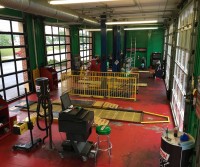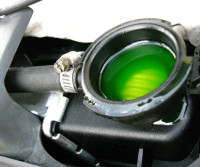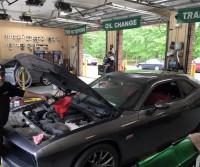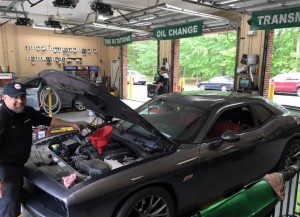
A vehicle tune-up is an important part of your car servicing. Besides your regular oil changes, performing routine maintenance can help extend the life of your vehicle. It can also help reduce the cost of future repairs.
You can check your vehicle’s owner’s manual to find out the recommended tune-up schedule for you. Newer vehicles can go from 25,000 miles to as many as 100,000 miles without needing a major tune-up.
Does My Car Need a Tune-Up?
Being proactive with your vehicle can help fix a minor problem before something major happens. A tune-up makes sure your vehicle functions properly and helps prevent future damage.
If you haven’t had a tune-up in a while, becoming familiar with common warning signs can save your time and frustration. Consider these common indicators that something wrong might be going on under the hood of your vehicle.
Vibrations or shaking
Noticing a shaking sensation in your steering wheel while you’re starting your vehicle, steering, or braking? This could be a sign of a number of different issues; from bad brakes and routers to your power steering. These types of problems are best to get it checked out by the professionals!
Rough shifting
Your vehicle’s automatic transmission handles how your vehicle’s gears-shift. Is your vehicle’s transmissions shifting hard, jerking, or shaking during a shift change? If it is, your vehicle’s transmission fluid may need to be changed or the fluid level may be too low.
Stalling
There are three primary causes of your vehicle stalling: .1 lack of fuel, 2. not receiving enough air or, 3. insufficient power. These can be caused by dirty or fouled spark plugs, water in the fuel, a faulty fuel pump, a bad ignition coil, or a bad sensor. Regardless of what is causing your car to stall, the best way to avoid high repair costs is to get your vehicle checked as early as possible.
Check Engine Light
This is usually a strong indicator that something is not working properly. When check engine light illuminates your dash, your vehicle’s computer stores a “trouble code” in its memory that identifies the source of the problem. When your check engine light comes on, it’s important to bring your vehicle to a professional so that your vehicle can be hooked up and diagnosed by reading warning code from your vehicle’s computer.
Is your car ready for a tune-up, or is your vehicle showing signs of a problem? Did you know that all six of your local Fast Lube Plus location can help you diagnose what is happening under the hood of your vehicle? Stop by today!

Besides your brake pads, fluids are the majority of the most important maintenance to your vehicle to keep on the road for several hundred thousand miles. Friction and heat are enormous by-products of the power your vehicle creates to shuttle us around, and without these fluids your vehicle will simply not work. Keeping these fluids fresh and full can make the difference between simple maintenance and costly repairs.
Which fluids should you check? Here are five of your engine’s fluids you should make a habit of checking:
ENGINE OIL
- Check your oil once a month.
- Check out your owner’s manual to know when to have the oil replaced. Timeframes depend on the car.
- Typical numbers are every 3,000 miles for newer engines up to 7,000 miles for high mileage. Higher mileage engines can go longer due to the parts being “worn in”, causing less friction meaning less lubrication is necessary.
TRANSMISSION FLUID
- Transmission fluid should be checked monthly.
- It should be replaced every 50,000 to 100,000 miles.
- This is a job for FastLube Plus or another professional, as many times gaskets must be replaced as well.
COOLANT
- Coolant should be checked twice yearly, before summer and before winter.
- It needs to be replaced every 2 to 3 years.
- Low coolant can lead to blown radiators when air (which can expand) enters the cooling system.
BRAKE FLUID
- You should check this once a month.
- Brake fluid needs to be replaced every 2 years.
POWER STEERING FLUID
- This fluid should be checked once a month.
- Check your owner’s manual for information of replacing power steering fluid. It greatly depends on the car.
The team at FastLube Plus is always happy to answer any of your questions. We can also check your engine’s fluids and replace any necessary fluids. A well-maintained car is synonymous with safe car. To schedule an appointment please call us at919.387.9996 to find your nearest FastLube Plus location.

Regardless of its brand or age, every car needs regular tune-ups. Their behind-the-scenes nature means some drivers don’t see their value, but investing in preventative measures and routine checkups can save you future headaches! Here’s what goes into an average tune-up.
General Tune-up Procedures
Tune-ups can vary depending on the car and who is performing the tune-up. Generally, a tune-up consists of checking the engine for parts that need cleaning, fixing, or replacing. Common areas under inspection include filters, spark plugs, belts and hoses, car fluids, rotors, and distributor caps. Many of these only require a visual inspection or a simple test.
While some of these checks can be done at home, having professionals give your car a comprehensive tune-up guarantees that the engine is fully examined.
At Fast Lube Plus, tune-ups can also include analyzing exhaust emissions, adjusting ignition timing and idle speed control, and a thorough maintenance inspection.
Filters and Spark Plugs
Though tune-ups come in a variety of flavors, they almost always include your filters and spark plugs.
Fuel filters, oil filters, PCV valves (which help ventilate the engine), and air filters all help keep your engine clean. The filters catch contamination. Over time, clogs can develop as unclean fluids, air, dust, and other impurities get caught in the filters. If unchecked, dirty filters can lead to higher oil pressure, fuel pump failure, and many other expensive and annoying problems.
Spark plugs are the tiny electrodes that handle the “combustion” part of an internal combustion engine. They are subject to wear over time, as the metal is constantly under high pressure and temperatures. Rough idling and hard starts are often due to worn spark plugs. Their accompanying wires, rotors, and distributor caps can also wear out, and a good tune-up includes their inspection.
 When to Get a Tune-up
When to Get a Tune-up
Though tune-ups are important, most cars don’t require them as often as they require other maintenance jobs, like oil changes. If you have a car from the 1970s or earlier, you probably should get a tune-up every 10,000 miles. Most newer cars should be checked every 30,000 – 50,000 miles or so, despite some manufacturers recommending a 100,000 mile interval.
Routine tune-ups are crucial to maintaining your engine’s performance and longevity. Next time you visit Fast Lube Plus, ask one of our experienced technicians about our tune-up services.
